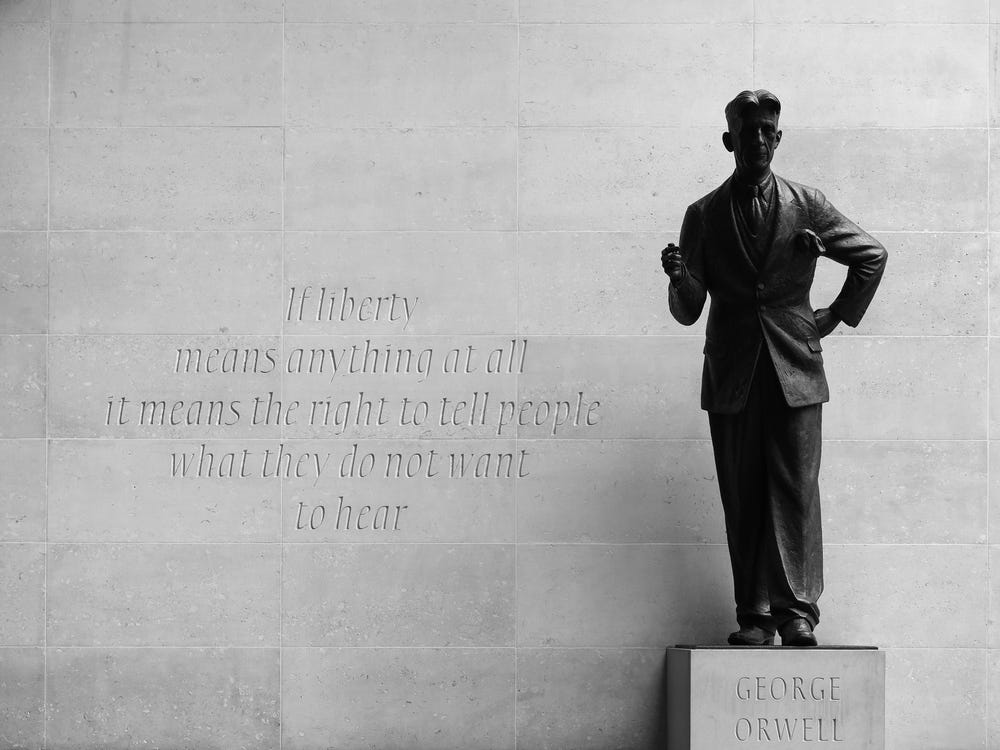E-Pluribus | December 29, 2022
The high price of censorship; a different take on the politics of white evangelicals; and George Orwell holds up pretty well.
A round-up of the latest and best writing and musings on the rise of illiberalism in the public discourse:
James Freeman: The Costs of a Closed Society
Surely as David French argued in a thread included in yesterday’s Around Twitter the government has a right to communicate its priorities to the public. James Freeman in The Wall Street Journal’s Best of the Web says, however, this does not extend to suppressing or pressuring others to suppress contrary viewpoints, a hallmark of closed societies.
Open societies like the United States thrive because free speech and vigorous public debate generally allow the best ideas to win in a competitive marketplace. Closed societies fail because a central authority of political apparatchiks can never be smarter than all the independent creativity of free citizens studying and proposing and testing and trying new ways to solve problems. Faced with the challenge of Covid, too many U.S. government officials not only refused to subject their disastrous lockdown policies to rigorous analysis, but appear to have tried to silence those most equipped to demonstrate the flaws of the shutdown strategy. Government officials opted for closing not just buildings but public debate, at a moment when America most needed the virtues of the open society.
[. . .]
Now the latest release of internal Twitter files reports that the federal government was leaning on the social media company to suppress even well-informed messages from highly accomplished doctors who didn’t toe the government line. Specifically suppressed were those who accurately pointed out that children were not at great risk from Covid.
After receiving files from Twitter, journalist David Zweig recently tweeted:
“The United States government pressured Twitter and other social media platforms to elevate certain content and suppress other content about Covid-19...”
Twitter executives did not fully capitulate to the Biden team’s wishes. An extensive review of internal communications at the company revealed employees often debating moderation cases in great detail, and with more care than was shown by the government toward free speech.
But Twitter did suppress views—many from doctors and scientific experts—that conflicted with the official positions of the White House. As a result, legitimate findings and questions that would have expanded the public debate went missing.
Read the whole thing.
Musa al-Gharbi: In Today’s Political Arena, White Evangelicals Aren’t the Big Story
That white evangelicals have taken over the Republican party has practically become a truism, but Musa al-Gharbi at Interfaith America disputes that assertion. White evangelicals are not a monolith, al-Gharbi writes, and not only that, many of the positions attributed to the group demonstrate consistency more than a move to align with a particular political party.
Some have attempted to justify the intense focus on evangelicals by highlighting how their views on many issues are outliers compared to the rest of the population. However, this is not a new phenomenon: Differences between white evangelicals and white non-evangelical Christians and non-Christians became statistically pronounced in 1984 and has been a persistent reality ever since. In short, white evangelicals have been outliers in polling for nearly 40 years.
It is also critical to contextualize the reason white evangelicals are outliers. Overall, evangelicals today are clearly more progressive on issues like race, gender, sexuality than they were in Nixon’s time or even in Reagan’s (reflected, for instance, in the share of white evangelicals who express support for gay marriage or interracial unions or women in leadership roles). The reason white evangelicals seem like outliers is that the rest of the public shifted earlier and more dramatically on many of these issues than white evangelicals did. Hence, even though white evangelicals and the rest of society are trending in the same general direction, the gap between them has continued to grow.
Put another way, evangelicals have not become more racist or sexist. If they seem more racist or sexist to contemporary social observers it’s likely because said social observers (especially highly-educated white liberals) have become significantly more progressive on social issues in recent years while white evangelicals have remained much more consistent.
Likewise, in terms of their share of the electorate in recent cycles, commentators have marveled at how, as a result of their relative turnout advantage, white evangelicals have apparently managed to comprise nearly the same exact vote share over the past decade despite evangelicals themselves comprising a smaller share of the U.S. population.
But again, there is a sense in which these stories bury the lede: If white evangelicals comprise the same share of the electorate over the last decade and allocated their votes in roughly the same way across all cycles, then it is really difficult to explain any political changes in recent years by appealing to the white evangelical vote.
Across the board, white evangelicals stand out more for their consistency than change.
Read it all here.
George Case: Politics and the English Language, 2023
George Orwell’s examination and illustration of the use and abuse of language is legendary. George Case at Quillette takes a look at Orwell’s masterpiece “Politics and the English Language” in the age of “systemic racism,” “hate speech,” and “climate emergency” and finds Orwell’s observations remain all too relevant.
“Politics and the English Language” addressed the jargon, double-talk, and what we would now call “spin” that had already distorted the discourse of the mid-20th century. “In our time,” Orwell argued, “political speech and writing are largely the defence of the indefensible. ... Thus political language has to consist largely of euphemism, question-begging and sheer cloudy vagueness. ... Political language—and with variations this is true of all political parties, from Conservatives to Anarchists—is designed to make lies sound truthful and murder respectable, and to give an appearance of solidity to pure wind.” Those are the sentences most cited whenever a modern leader or talking head hides behind terms like “restructuring” (for layoffs), “visiting a site” (for bombing), or “alternative facts” (for falsehoods). In his essay, Orwell also cut through the careless, mechanical prose of academics and journalists who fall back on clichés—“all prefabricated phrases, needless repetitions, and humbug and vagueness generally.”
These objections still hold up almost 80 years later, but historic changes in taste and technology mean that they apply to a new set of unexamined truisms and slogans regularly invoked less in oratory or print than through televised soundbites, online memes, and social media: the errors of reason and rhetoric identified in “Politics and the English Language” can be seen in familiar examples of empty platitudes, stretched metaphors, and meaningless cant which few who post, share, like, and retweet have seriously parsed. Consider how the following lexicon from 2023 is distinguished by the same question-begging, humbug, and sheer cloudy vagueness exposed by George Orwell in 1946.
[. . .]
Climate, information, popular knowledge, genocide, land claims, sexual assault, and racism are all serious topics, but politicizing them with hyperbole turns them into trite catchphrases. The language cited here is largely employed as a stylistic template by the outlets who relay it—in the same way that individual publications will adhere to uniform guidelines of punctuation and capitalization, so too must they now follow directives to always write rape culture, stolen land, misinformation, or climate emergency in place of anything more neutral or accurate. Sometimes, as with cultural genocide or systemic racism, the purpose appears to be in how the diction of a few extra syllables imparts gravity to the premise being conveyed, as if a gigantic whale is a bigger animal than a whale, or a horrific murder is a worse crime than a murder.
Read it all.
Around Twitter
Via Thomas Chatterton Williams, if education and reading in particular are vital to a free society, we have cause for concern (although the development mentioned below is cause for some optimism):
Nico Perrino, the executive vice president of Foundation for Individual Rights & Expression, with the story of an art historian fired for showing his students… art:
And finally, via the Foundation for Individual Rights & Expression, a good reminder from the Father of our Country:









